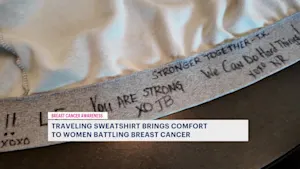More Stories
A certain group of patients and survivors of breast cancer are especially at risk because, statistically, they are less likely to seek treatment early on - men.
"The whole system was not set up for guys," breast cancer survivor and advocate Harvey Singer said during a Zoom interview Monday afternoon.
Singer said he would often feel isolated during treatment after he was diagnosed with breast cancer in 2008. Singer started the nonprofit HIS Breast Cancer Awareness to support men with breast cancer and to work with treatment providers to better accommodate male patients.
Men account for about 1% of all breast cancer diagnoses.
"They didn't know how to treat us, exactly," Singer said. "It's gotten a lot better in the last 15 years. Some of that's from the work we've done through the foundation. Some of it's just natural growth."
Singer said he often finds himself trying to convince at-risk men to put aside any "machismo" that might keep them from going to a doctor.
The Centers for Disease Control and Prevention has reported that male breast cancer patients are four times as likely to die than females because men are less likely to seek medical attention upon first noticing a lumps in their breast tissue.
"My experience talking to guys is that they don't like going to doctors. They don't like to be told. It's emasculating," he said. "[They would say] 'Oh there's nothing wrong with me.' I had a dad like that' 'Nothing wrong with me. I'm a big, strong guy.'"
Some breast cancer treatment professionals said they have noticed pride has prevented some men from immediately getting proper medical attention.
"There's a cultural component to this that I've experienced," Westchester Medical Center Cancer program director Dr. Christine Pellegrino said during a Zoom interview Tuesday.
Pellegrino, pleased with the work of advocates like Singer, said that on her end, she is planning on updating her program to be more inclusive of men.
She said that over her career, she has noticed some providers have begun making special efforts to make themselves more approachable for men, and some are even modifying facility names.
"I feel for men who have to come for breast imaging," she said, "and they walk into 'Women's Imaging Center.' That's something I think is up for change."
More from News 12
1:32

beWell: Proactive and empowering breast cancer awareness info
2:12

A hoodie and hope: New Jersey women share sweatshirt to bring comfort during breast cancer treatment
2:30

DiCuore Diamonds founder Daniela Sokolowski's breast cancer survival story
2:06

Gjoko Salon & Spa in Larchmont holds Breast Cancer Awareness Fundraiser
4:45

Actress brings real-life experience with BRCA gene, genetic testing to 'Love Danielle'
2:52
